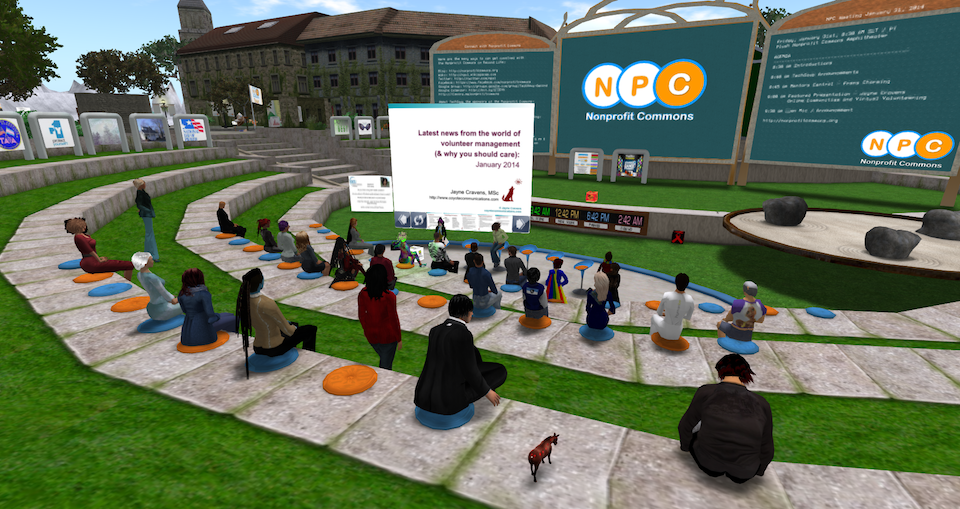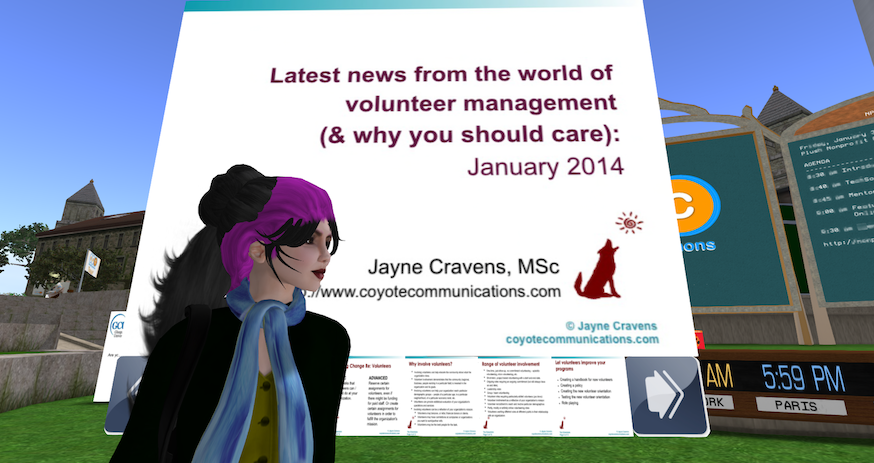
An online multimedia platform that allows people to create an avatar for themselves and “live” in an online virtual world. Avatars interact with places, objects and other avatars, exploring the virtual world, meeting other residents, socializing, having business meetings, hosting events, participating in group activities, building, creating, shopping, collaborating, even trading virtual property and services with one another.
Mark Zuckerberg’s Metaverse? No! I’m talking about Second Life, which launched back in 2003. The image at the top of this blog, and the image below, are of me, as an avatar, leading an event in Second Life for TechSoup back in 2014:

TechSoup was an early and passionate adopter of Second Life, hosting numerous online events there. If you do a search for Second Life on the TechSoup forum, you would find numerous references to the platform and TechSoup activities there over the years.
Mark Zuckerberg, founder of Facebook (now Meta), said to much fanfare that he wanted to launch his own metaverse. The new virtual-reality app Horizon Worlds is Facebook’s first foray into the much-hyped “metaverse” for Facebook parent company Meta. Horizon Worlds, a beta version of which featured prominently in Zuckerberg’s announcement, launched Dec. 9 in the United States and Canada on the company’s Oculus virtual-reality platform and represents its first major attempt to deliver on his vision.
Were you on Second Life? Are you still on Second Life? Did you participate in TechSoup’s events on Second Life, or any other nonprofit-related activities? What do you think emerging virtual worlds, including Meta’s projects, can learn from Second Life? Comment below!
This article from The Duke Law Journal, The Development and Failure of Social Norms in Second Life, seems like something that the Meta folks should read. Its conclusion about Second Life:
Second Life is so thoroughly steeped in conditions that have impeded the development of successful social norms in other communities that any system of social norms in Second Life will ultimately fail. Because social norms will likely fail to successfully maximize resident welfare, regulatory schemes imposed both by the operators of the virtual world and by real-world governing institutions are needed to enhance the functioning of this particular alternative reality inhabited by millions.
Do you think Meta’s virtual world is addressing this issue? Do you think they need to plan for how to address such? And are you worried about safety at all with any online platforms? Comment below!
Nina Jane Patel was targeted with sexual harassment in Facebook/Meta’s platforms. “Within 60 seconds of joining — I was verbally & sexually harassed — 3–4 male avatars, with male voices, essentially, but virtually gang-raped my avatar & took photos…” The 43-year-old mother said it was such a “horrible experience that happened so fast” before she even had a chance to think about using “the safety barrier,” adding that she “froze.” She continued by confessing how both her “physiological and psychological” reaction was similar to it happening in real life. “Virtual reality has essentially been designed so the mind and body can’t differentiate virtual/digital experiences from real,” Patel wrote.
This is similar to assaults that happened in Second LIfe. Examples:
- “Virtual Rape” Claim Brings Belgian Police to Second Life, April 24th, 2007
- AvatarRape: Colleges need to recognize that their students are being harassed in virtual environments, writes Michael Bugeja, February 2010.
Horizon Worlds is supposed to be limited to adults 18 and older. In practice, however, very young kids appear to be among its earliest adopters. Some say the presence of children in Meta’s fledgling metaverse raises a grave concern: that by mixing children with adult strangers in a largely self-moderated virtual world, the company is inadvertently creating a hunting ground for sexual predators.
When new online forums arise that attract kids, sexual predators “are often among the first to arrive,” said Sarah Gardner, vice president of external affairs at Thorn, a tech nonprofit that focuses on protecting children from online sexual abuse. “They see an environment that is not well protected and does not have clear systems of reporting. They’ll go there first to take advantage of the fact that it is a safe ground for them to abuse or groom kids.”
More on safety for children in virtual worlds from the Washington Post.
Could nonprofits that engage in an online metaverse be putting their clients or others at risk by asking them to be there too? Comment below!
There’s one more consideration: accessibility. If you engage with people in a graphics-based environment, you are leaving out people who have sight-impairments. How will auditory displays work for graphics-based environments to address accessibility issues (I’m asking because I really don’t know)? Or is it a matter of ensuring you never limit your service delivery and volunteer engagement to only a graphics-based environment?

There is section devoted to virtual volunteering and avatar-based environments in The Last Virtual Volunteering Guidebook. The section offers some examples of nonprofits using Second Life to engage with clients and volunteers, and offers specific advice on how a nonprofit should get started using such environments, considerations to explore and pitfalls to avoid – all of which is relevant for any graphics-based virtual world. The rest of the book is easily adaptable to engaging with volunteers in graphics-based/avatar-based virtual worlds as well.
Looking forward to hearing your comments!

If you have benefited from this blog or other parts of my web site and would like to support the time that went into researching information, developing material, preparing articles, updating pages, etc. (I receive no funding for this work), here is how you can help.

Thanks Jayne for this! I had no idea that meta worlds existed before the big Meta hype. Seems interesting to me especially for teaching and learning activities. I will need time to explore this but I’m grateful to the pointer you provided.